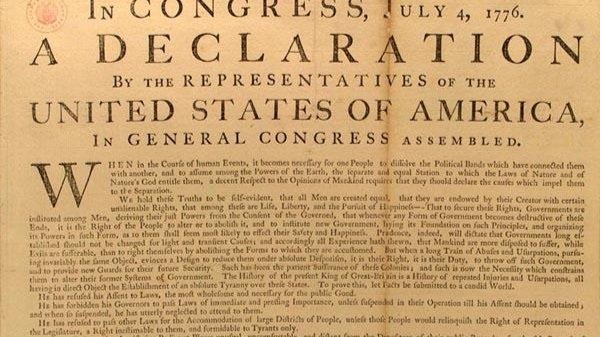It’s self-evident that the Declaration of Independence is a deeply hypocritical document.
For all its ringing words about rights, with life, liberty and the pursuit of happiness listed as primary ones, for its claims of the importance of freedom and the power of people to choose their own government, it is a fraud.
The Declaration was written by and for white men. It only empowered them to break free from England to form their own nation. Of the approximately 3 million people living on the eastern seaboard of North America in 1776, most were excluded.
And yet, when the colonies of New Hampshire, Massachusetts, Connecticut, Rhode Island, New York, New Jersey, Pennsylvania, Delaware, Maryland, Virginia, North Carolina, South Carolina and Georgia decided to join together to create a new nation, they were responsible for a truly historic action.
The Continental Congress appointed five men to draft the declaration: Benjamin Franklin of Pennsylvania, Thomas Jefferson of Virginia, John Adams of Massachusetts, Robert R. Livingston of New York and Roger Sherman of Connecticut.
The principal author, Jefferson, owned more than 600 slaves in his lifetime and carried on a lengthy sexual relationship with one of them, Sally Hemings. She was a mere teen when this began, and was his property.
He denied the children born of their union, and set them to work on his plantation to pay for his expensive habits, including wine and first-edition books. He called for returning Black Americans to Africa.
The Declaration of Independence gave no mind to women, or Native Americans or anyone who wasn’t a white, male property owner .
And yet …
The Declaration of Independence still matters. It was written by flawed men, products of their time and culture. But the basic idea it expresses — that a free people should decide for themselves who they were governed, matters.
While we commemorate the final version of the document approved on July 4, 1776, there is another, lesser-known event from July 5 worth recalling.
On July 5, 1852, abolitionist leader Frederick Douglass, a former slave, delivered a speech titled “What, to the Slave, is the Fourth of July.”
Speaking at Corinthian Hall in Rochester, N.Y., the great orator began by praising the Founding Fathers.
“Fellow Citizens, I am not wanting in respect for the fathers of this republic. The signers of the Declaration of Independence were brave men. They were great men, too, great enough to give frame to a great age. It does not often happen to a nation to raise, at one time, such a number of truly great men. The point from which I am compelled to view them is not, certainly, the most favorable; and yet I cannot contemplate their great deeds with less than admiration. They were statesmen, patriots and heroes, and for the good they did, and the principles they contended for, I will unite with you to honor their memory.”
But then he hammered home the truth.
“I am not included within the pale of glorious anniversary! Your high independence only reveals the immeasurable distance between us. The blessings in which you, this day, rejoice, are not enjoyed in common. The rich inheritance of justice, liberty, prosperity and independence, bequeathed by your fathers, is shared by you, not by me. The sunlight that brought light and healing to you, has brought stripes and death to me. This Fourth July is yours, not mine. You may rejoice, I must mourn.”
For millions of Americans, that remains the case today, 245 years after a few dozen white men gathered in Philadelphia to declare the 13 colonies a new nation.
While we attend parades, watch fireworks fill the sky and devour hot dogs, beer and ice cream, we must acknowledge the painful truths that are before us. Racism, growing economic disparity and deeply rooted partisan divides are as much a part of America as baseball, apple pie and political corruption.
But Douglass realized there was hope based on the principles declared that hot summer of 1776.
“While drawing encouragement from the Declaration of Independence, the great principles it contains, and the genius of American Institutions,” he said “my spirit is also cheered by the obvious tendencies of the age.”
That’s why these words still matter, and why it is up to us now, nearly two and half centuries since the Declaration of Independence was drafted, to aspire to live up to its message, to make America a nation that matches its blueprint document.
“We hold these truths to be self-evident, that all men are created equal; that they are endowed by their Creator with certain unalienable rights; that among these are Life, Liberty, and the pursuit of Happiness; that, to secure these rights, governments are instituted among Men, deriving their just powers from the consent of the governed; that whenever any form of government becomes destructive of these ends, it is the right of the people to alter or to abolish it, and to institute new government, laying its foundation on such principles, and organizing its powers in such form, as to them shall seem most likely to effect their safety and happiness.”
Tom Lawrence has written for several newspapers and websites in South Dakota and other states and contributed to The New York Times, NPR, The London Telegraph, The Daily Beast and other media outlets.
